 Our Heavenly Father has gifted us with two wonderful blessings, being a husband or wife, and being a parent. Whether it is by the gift of a child to each other or through the loving action of adoption or circumstance it is a calling that will live with you for time and eternity. We are given the wondrous blessings of having the restored Gospel to help us enjoy and get the most pleasure of being a parent and having a loving family. Family and the Priesthood What a blessing it is to have the Priesthood in our lives. It is the responsibility of a priesthood holder to help protect, enrich, and provide for his family the same blessing that was bestowed upon him when becoming a priest. This also is shared with other families that may not have a priesthood holder in the household. By living through Gospel principles, and everlasting covenants the family benefits both spiritually and emotionally. It is said, “Pray in your families unto the Father, always in my name, that your wives and your children may be blessed.” (Book of Mormon, 3 Nephi 18:21). To this I understand the expression that “a family that prays together, stays together”. Devotion to the Lord and Our Family Our families should be cherished like pure spring water from the mountains and streams. They are our most cherished gifts from our Heavenly Father and we must ensure that there is stability of mind, body, and soul. Devoted parents are the key to salvation for your children and generations to come. Our first steps should always be steps taken on the path of righteousness. Through this our families can find joy and happiness even in the most troubled moments of our lives, love is the answer. Be the Best at Your Callings When we are given a calling it should become second nature to do our best in what is put before you. Whether it is a calling from our Church or a calling from our Heavenly Father we should always do our best to help others and ourselves. Our family responsibilities are the most important and blessed calling that is bestowed upon us. Showing love to one another will reflect upon our children the importance of showing and sharing love. Working together also instills a good foundation for our children to build their own families upon. “A new commandment I give unto you, that ye love one another; as I have loved you, that ye also love one another.” (New Testament, John 13:34). Sometimes we find it difficult to love unconditionally because of our past hurts and instances. If we remember and follow Our Savior's example of love, even in these modern times when it seems difficult, we can feel and share his love. Forever Families In one of my favorite children's hymns there is a line that says, “Families can be together forever, through Heavenly Father’s plan”. If we look at Our Father’s Plan of Salvation by understanding the Creation, the Fall, the Atonement, and living the principles of the Gospel, we can have family relationships that will last for all time and eternity. What a wonderful feeling that can only warm your heart with joy and love. We have been blessed with an opportunity to come closer to or Heavenly Father and Our Lord and Savior, Jesus Christ by reading and pondering the Holy Bible and the companion Book of Mormon to open the spiritual doors to everlasting life and happiness. I hope that you enjoyed reading this as much as I have sharing this with you. I was inspired by the writings of President Boyd K. Packer.
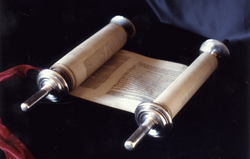 The Church of Jesus Christ of Latter-day Saints has an "open canon" of scripture. This means that the LDS Church teaches that God's revelation of divine principles to mankind did not end with the conclusion of the Holy Bible. It is a fundamental belief in Mormonism that God has not shut the door on mankind, that the fullness of the Gospel of Jesus Christ has been restored to the earth, and that God speaks to us today through the mouths of His prophets and through personal revelation in answer to prayer. Officially, there are four books which the LDS Church has declared "canon". Together, these books of scripture constitute the "Standard Works". Here they are in no particular order.
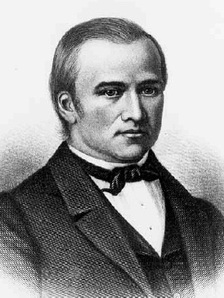 Newel K. Whitney (left) is an extremely important figure in the history of Mormonism. While somewhat obscure, many members of the Church of Jesus Christ of Latter-day Saints are familiar with story of his first encounter with Joseph Smith, in which the Prophet famously said, "Newel K. Whitney, thou art the man." But a story like this one needs a little background. Born in 1795, a full ten years before Joseph Smith Jr., the first Prophet of the Church, Newel Whitney grew up in Vermont, but as an adult would move to Kirtland, Ohio and open a general store having some success in business. In the late 1820's, Newel and his wife, Elizabeth Ann Whitney were on a spiritual journey of sorts. They were looking for a church to join, and for a while were active in the Campbellite movement, though eventually returned to their search. In late 1830, just months after the Church of Jesus Christ of Latter-day Saints had officially been founded, the Whitneys were visited by the missionaries, who brought with them a copy of the Book of Mormon. Elizabeth Whitney heard the missionaries' message first, and was deeply moved, getting baptized into the Church November of that year. Newel still wasn't convinced though, and continued to pray for an answer. In February of 1831, Joseph Smith himself journeyed to Kirtland, Ohio and showed up unannounced to Newel K. Whitney's store. Joseph marched right up to Newel and proclaimed, "Newel K. Whitney, thou art the man!" Whitney had never seen Smith in his life, and didn't know what the Prophet was talking about, or how he knew his name. Smith explained, "I am Joseph the Prophet. You prayed me here; now what do you want of me?" This was exactly the witness that Whitney needed. Soon Newel K. Whitney would join the Church, and in time became one of the greatest leaders in the history of Mormonism. When he died in 1850, he was the Presiding Bishop of the Church. He left a great legacy, and one that continues to today. His family and descendants shared his trait of hard work and faith, and continue to bless the world through their service.
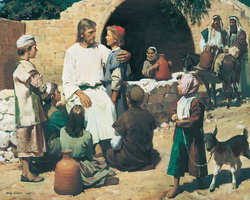 Jesus Christ takes on many roles. He is our teacher, our master, our elder brother, and our redeemer, just to name a few. One exceptionally large role he fills is as the Son of God. But what does it mean to be the Son of God? Aren't we all God's children?
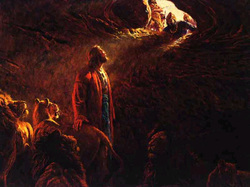 The Holy Bible is rife with role models ready to emulate. One such example is the famous Old Testament prophet Daniel. The main reason would would strive to be like Daniel is his stalwart resilience. He knew and loved his God, and was willing to do anything for Him. Daniel's boldness was in full display when he famously found himself cast into a den of hungry lions. Daniel was not only a spiritual leader (as the Lord's prophet) but also a member of the king's court. Throughout his life, Daniel would serve as a courtier to five kings, but his famous acts in the lions' den happened while serving under Darius of Mede. Darius' court consisted of a large pool of men in line for the throne, who were presided over by a council of three presidents. These three presidents were in turn led by King Darius himself. Darius was fond of Daniel, viewing him with deep respect, so early in his kinghood, Darius promoted Daniel to the office of the first of these three presidents, in effect making Daniel second in command over the kingdom. The men-in-waiting and the other presidents were not too pleased with this decision, and therefore set out to find something with which they could incriminate Daniel. Some past transgression, some scandal they could dig up to make him appear undesirable to be in such a high office. They came up empty. Daniel was a clean slate; nothing in his history could be used against him. If they were to condemn this man, they would have to somehow make his righteousness a crime. So the court confronted the king and by some means coerced him to sign an abominable proclamation: In the next thirty days, anyone caught praying to any man or God, unless they prayed to the king, would be thrown in a den of lions. When he learned of this proclamation, Daniel boldly decided not to change a thing. He went straight home and poured out his soul to his God, and continued his usual habit of praying three times a day. As this edict was designed to snare Daniel in particular, those behind it descended upon him and caught him in the act of praying. King Darius realized at this time the seriousness of the situation. His decree now put the life of his good friend Daniel in peril. Wanting desperately to rectify the situation, Darius sought to reverse the command. He was stopped however by his court, who reminded him that, under the laws of the Medes and the Persians, the decree was irrevocable. Darius was forced to put Daniel into the den and seal the entrance, but not before sharing a desperate, parting word with his friend: "Thy God whom thou servest continually, He will deliver thee." Reluctantly sealing the den, Darius went home. That night, he sent away all distractions from his quarters, and spent the night in prayer and fasting, losing much sleep begging the Lord to spare his friend. Early in the morning, the king ran for the lions' den, and opened it up. Not knowing what to expect, King Darius cautiously called out to Daniel, "O Daniel, servant of the living God, is thy God, whom thou servest continually, able to deliver thee from the lions?" Miraculously, Daniel's voice rang out from inside the cave, "O king live for ever. My God hath sent His angel, and hath shut the lions' mouths, that they have not hurt me: forasmuch as before Him innocency was found in me; and also before thee, O king, have I done no hurt." Daniel's timeless story is a wonderful reminder of the blessings associated with righteousness. True, because of the wickedness of other men, Daniel's righteousness landed him in a den of lions, dire circumstances to be sure. But also because of his righteousness, Daniel was delivered. His personal righteousness and his insistence of praying to His God, seemingly damning in this situation, actually spelled his deliverance. When the Lord commands, we do, and any trial we face because of our obedience is far outweighed by the blessing our righteousness will entitle us to. It may not come in such an evident and dramatic matter as it did for Daniel, and it may not even happen in this earthly life, but it will come, and it will be worth it. I testify of these things in the name of our Savior Jesus Christ--Amen.
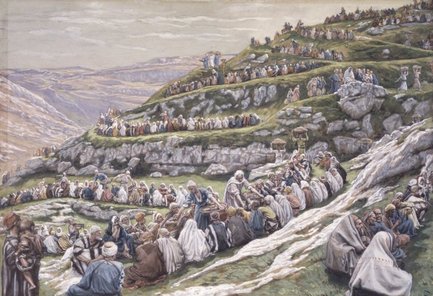 After crossing the Sea of Galilee, Jesus Christ and His disciples went up into the mountains. The feast of Passover was soon. Looking up from where He sat, Jesus saw a large crowd of people making their way up the mountain towards them. Having seen the miracles Jesus could perform, they had followed the Savior, wanting to learn from Him. They numbered about five thousand. Knowing it was time for the feast of the Passover, Christ said to His apostle Philip, " Whence shall we buy bread, that these may eat?" Philip informed the Savior that the money they had would not buy enough bread to feed so many people, even if they just had a morsel each. Of course, Christ knew this. He only asked to test Philip. He knew exactly what needed to be done. Just then, the apostle Andrew (Simon Peter's brother) came to the Lord and said, "There is a lad here, which hath five barley loaves, and two small fishes: but what are thy among so many?" Jesus had the multitude sit down on the grassy hill. Giving thanks to His Father in prayer, He handed food to each of His disciples, who distributed generous helping of fish and bread o all who were gathered. As the multitude finished up the feast. Jesus asked that His disciples go back through the crowd and gather up the leftovers of the meal, so nothing would go to waste. The leftover food filled twelve baskets of bread. All who were there who had seen this miracle proclaimed, "This is of a truth that prophet that should come into the world." And thus by small and simple means, did the Son of God make great and wonderful things to pass. In His holy name, Jesus Christ-- Amen.
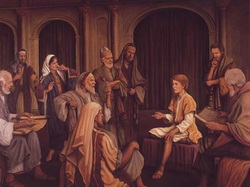 When Jesus Christ had grown to twelve years of age, He lived in Nazareth with His mother Mary and step-father Joseph. He was filled with the Spirit of God and had wisdom far beyond His years. Every year, Joseph and Mary had the tradition of going to Jerusalem for the feast of the Passover. Young Jesus accompanied His parents to the Passover feast. When all was said and done, Joseph and Mary packed up and made the return journey to Jerusalem, unaware that Jesus was not with them. Too understand how they could have forgotten their only child, a child who would be Savior of the world one day for that matter, it must be understood that the family was traveling in a large caravan. Joseph and Mary's extended families were all making this trek together. It would make sense for them to think that Jesus was simply with some of the other children in the caravan. After traveling for a whole day, Joseph and Mary, searching throughout the caravan, noticed that Jesus was not among them. Panicked, they returned to Jerusalem to search for their son. After what must have been a torturous three days of searching, Mary and Joseph finally happened upon the twelve-year-old Christ. They found him in the temple, conversing with some well-versed priests. The men were exceedingly amazed at this young boy and His extraordinary knowledge of the things of God. Tremendously relieved to find her son, Mary came to Jesus and did what any concerned mother might do, and scolded Him for wandering off on His own. "Son, why hast thou thus dealt with us? Behold, thy father and I have sought thee sorrowing." Today, she might have said, "Son, how can you do this to us!? Your father and I have been worried sick!" Being very wise for His age, Jesus simply answered, " How is it that ye sought me? Wist ye not that I must be about my Father's business?" The reunited family then happily returned home. This account, from Luke chapter two is the first time we are told of Christ taking upon Himself the magnitude of His calling in life. It can be reasoned that this early act of wisdom was when He truly understood the meaning of His station. Being "about His Father's business," had him in the temple, studying, worshiping, and strengthening other children of the Lord. It is incredible to think that at such a young age, He knew is purpose. He knew the tremendous things that God had in store for Him. He had the conviction and discipline to work and speak by the Holy Spirit in all things. An excellent example for us all if their ever was one. I conclude in His name, Jesus Christ-- Amen.
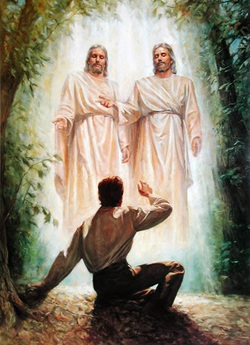 The name Joseph Smith inspires an entire possible spectrum of emotions from those who have heard it before. While many revere and love the things he accomplished, there are others who view him as either a deceived fool or an ingenious deceiver of others. It is safe to say that he is one of the most controversial figures of the nineteenth century. But all of this considered, I'd say Joseph Smith and his legacy have had a profound impact on my life. As a boy I was taught the stories of his life: his encounter with God and Jesus Christ at age fourteen, the visitation of an angel named Moroni, who led him to a set of golden plates inscribed with the record of ancient Jews in America. As a kid, I never doubted this. Why should I? It was what I was taught from an early age, alongside the stories of the Bible. These cherished beliefs were taken for granted. It was just part of me, as much the part of me that knew the sky was blue. But as anyone who has ever grown up knows, age brings with it some degree of cynicism. The sunny world of our childhood, if we let it, can become the oppressive regime of our teen years. Of course, I never felt "oppressed" by my religion. But, as everyone does, I began to analyze the world around me with more scrutiny. In my formative late teens, I was confronted with all manners of challenges to my faith, which ironically seem to shape my faith today. As I became a man, I felt the need to discover myself, to (much like Joseph Smith had) really figure out what I believed. This involved much study, much prayer, and faith that my Lord would answer these prayers. I think the problem most people run into with this is that they expect their answer to be all at once, a sweeping glorious experience of faith-affirming revelation. This can happen, but is frequently untrue. My testimony-building experience has been, and still is, gradual. Isaiah's timeless words ring true in my life: "But the word of the Lord was unto them precept upon precept, precept upon precept; line upon line, line upon line; here a little, and there a little..." (Isaiah 28:13) The abundance of material out there that purports to "disprove" Joseph Smith and his claims does not bother me, because my study and prayer has led my to a different conclusion: that Joseph Smith did not, and could not churn out a pseudo-religious novel as complex as the Book of Mormon. My study and prayer has confirmed in my mind that, though imperfect, this man was a prophet ordained of God, who truly saw what he said he saw, and instructed by God to restore the fullness of the gospel of Jesus Christ to the earth once more. Joseph Smith, his legacy of faith, and his love for Jesus Christ have compelled me, changed me even. I am ever grateful that in 1820, he knelt in a grove of trees, and asked his Father for clarity, and eternally grateful that his prayer was answered when he witnessed God the Father and Jesus Christ. I love this gospel with all my heart, and am grateful for it every day.I'll close in the name of Jesus Christ-- Amen.
|








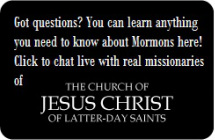
 RSS Feed
RSS Feed